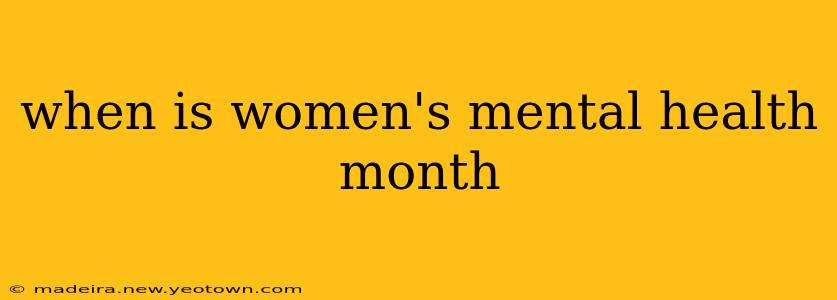When is Women's Mental Health Month? A Journey Through Understanding and Support
May is Women's Mental Health Month. It's a time not just for acknowledging the unique challenges women face regarding their mental well-being, but also for celebrating the strength, resilience, and progress made in advocating for better mental healthcare access and understanding. This isn't just a date on a calendar; it's a crucial opportunity for reflection, conversation, and action.
The story of Women's Mental Health Month isn't a single event but a growing movement. It started with the recognition that women often experience mental health issues differently than men, facing unique societal pressures and biological factors that contribute to conditions like anxiety, depression, postpartum depression, and eating disorders. These complexities often lead to underdiagnosis, undertreatment, and a stigma that prevents women from seeking the help they desperately need.
Throughout the month of May, and indeed throughout the entire year, countless organizations and individuals work tirelessly to raise awareness, promote early intervention, and challenge the pervasive stigma surrounding women's mental health.
Why is May designated as Women's Mental Health Month?
The specific origin of designating May as Women's Mental Health Month is less clearly documented than some other awareness months. However, its timing is strategic. It leverages the broader awareness around mental health that often occurs in May, aligning with Mental Health Awareness Month (also in May) and providing a focused lens specifically on the needs of women. This concentrated effort allows for greater impact and broader reach within a concentrated timeframe.
What are some common mental health challenges faced by women?
Women disproportionately experience certain mental health conditions. Some of the most prevalent include:
- Depression: Often linked to hormonal changes, societal expectations, and life events like childbirth or relationship difficulties.
- Anxiety: Women frequently report higher rates of anxiety disorders, including generalized anxiety disorder, panic disorder, and social anxiety disorder.
- Postpartum Depression (PPD): This serious condition affects women after childbirth, impacting mood, sleep, and ability to care for themselves and their baby.
- Eating Disorders: Societal pressure to conform to unrealistic body image standards significantly contributes to the higher rates of eating disorders among women.
- Trauma and PTSD: Women are more likely to experience trauma and its resulting effects, including post-traumatic stress disorder (PTSD).
It's important to remember that these are just some examples, and every woman's experience is unique.
What resources are available for women struggling with their mental health?
There's a wealth of support available, including:
- Therapists and Counselors: Mental health professionals can provide evidence-based treatments tailored to individual needs.
- Support Groups: Connecting with others facing similar challenges can provide comfort, understanding, and practical advice.
- Online Resources: Numerous websites and apps offer information, support, and self-help tools.
- Helplines: Confidential helplines are available 24/7 to provide immediate support and guidance.
How can I support a woman struggling with her mental health?
Supporting a woman facing mental health challenges requires empathy, understanding, and action. This can include:
- Listening without judgment: Offer a safe space for her to share her experiences.
- Encouraging professional help: Gently suggest seeking professional support if she's struggling.
- Educating yourself: Learning more about women's mental health challenges can help you better understand and support her.
- Reducing stigma: Speaking out against negative stereotypes and attitudes towards mental health is crucial.
Women's Mental Health Month is a call to action. It's a time to break the silence, challenge the stigma, and foster a culture of support and understanding. Remember, seeking help is a sign of strength, not weakness. If you or someone you know needs help, please reach out. Your well-being matters.

